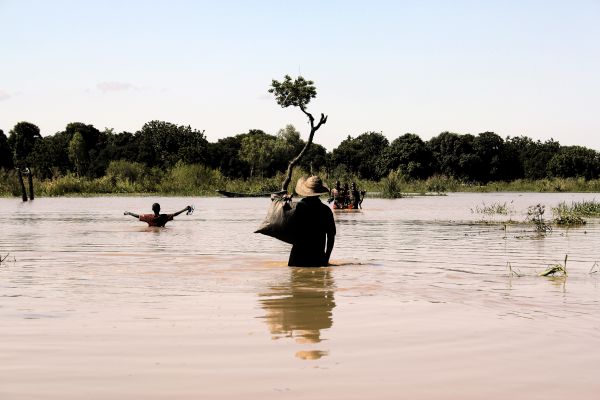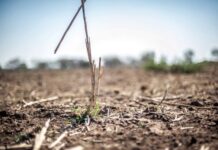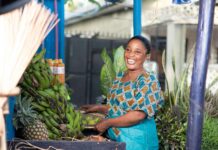By Muhammad Eyinfunjowo, Global Development Communications Specialist
In 2024, floods in Nigeria devastated entire farmlands, wiping out crops, displacing up to 200,000 people, and disrupting food production and distribution. If decisive mitigation measures are not urgently implemented, the situation in 2025 will likely remain the same.
In a practical effort to address these challenges, the Nigerian government has committed to developing and adopting climate-smart, low-carbon farming practices nationwide through the recently signed $1.1 billion Green Imperative Project (GIP) with Brazil.
However, while the government is engaged in discussions about effective, sustainable agricultural solutions related to this project, smallholder farmers who contribute up to 80 per cent of Nigeria’s food supply already struggle to implement locally available climate-smart practices that could help protect their livelihoods and the country’s food security.
These farmers struggle to adopt climate-smart farming practices, ranging from crop rotation to water conservation and organic fertilisation, because of the lack of communication. Not just any communication, but clear, localised messaging that resonates with them.
To effectively increase food production in Nigeria while protecting the environment and helping farmers build resilience against climate impacts, we must utilise social marketing—a strategy that has influenced behavioural change across industries worldwide through clear, impactful communication.
Social marketing is unlike the typical promotion of new practices to a set of people; it is a targeted approach that uses tailored messages that improve people’s knowledge to drive behavioural change for the good of their societies. It has successfully encouraged healthier eating, increased vaccination rates, and promoted environmental conservation globally.
When applied to promoting sustainable agriculture practices among farming communities, social marketing can help change the attitudes of farmers, agribusinesses, and policymakers to climate impacts like floods in Nigeria.
International NGOs like the International Food Policy Research Institute (IFPRI) already use social marketing tools, including research publications and workshops that educate policymakers, to shape sustainable agriculture policies in the country. However, the messages from these publications and workshops often fail to reach the farmers who need them the most.
For many smallholder farmers in Nigeria, policy documents and research reports remain inaccessible due to language barriers, the complexity of topics, or a lack of direct engagement with them.
Besides, sustainable agriculture policies alone won’t change farmers’ behaviours. Farmers need to see the immediate and long-term value in adopting sustainable practices before integrating them with their traditional farming systems. This is where localised communication as a social marketing tool plays a crucial role.
The Nigerian government and international NGOs need to invest in culturally relevant storytelling, community radio programs, and farmer-to-farmer knowledge sharing instead of relying solely on policy briefs.
For instance, imagine a farmer in Katsina hearing a fellow farmer on the radio explaining how he doubled his maize yield through soil conservation. Or consider members of a farmers’ cooperative in Ondo learning about drought-resistant crops via a voice note broadcast on WhatsApp. These approaches resonate with farmers far more than complex, science-based policy documents.
One striking example of effective localised communication is the success of community-led farmer training in Malawi, where rural farmers were introduced to conservation agriculture through field demonstrations and local champions. Adoption rates increased because the messages were simplified, personalised, and delivered by trusted peers.

Similarly, Kenya’s integration of indigenous farming knowledge with modern sustainability practices has successfully aided a sustainable switchover from traditional farming methods, widely characterised by low crop yields and a continual loss of soil fertility. This was done with the help of on-the-field experts from local NGOs, providing training and technical assistance on sustainable agricultural land management practices that could help improve formerly degraded lands.
Nigeria can replicate these by strengthening local communication networks and ensuring messages are tailored to different regions, languages, and farming traditions. Existing farmer-oriented radio talk shows in the country need to be amplified through better government support and funding to reach every farmer.
The success of integrating modern sustainability practices with indigenous farming knowledge in Kenya has proven that communications from local NGOs play an essential role in bridging the gap between high-level policy documents and on-the-ground realities.
By equipping local NGOs with the right tools—radio airtime, social media training, and simplified extension materials—the Nigerian government can empower them to drive sustainable change at the grassroots level. These organisations can also serve as feedback channels, helping policymakers understand what works on the ground and what doesn’t.
The urgency of food insecurity created by erratic rainfall and floods in the country simply means we cannot afford to only rely on policy documents that never leave government offices. To effectively promote sustainable agriculture among farmers as a solution, the government and international NGOs must prioritise effective, localised communication.
This involves investing in farmer-friendly communication channels such as community radio, social media, and village meetings. It also involves training local NGOs and extension workers to translate policies into actionable, relatable messages, using storytelling and real-life testimonials to show the benefits of climate-smart farming, and encouraging farmer-to-farmer knowledge sharing through cooperatives and agricultural groups.
Research must also be made more accessible by simplifying language and removing technical jargon—this can be achieved with the help of content and public relations specialists in the country.
If farmers do not understand the benefits of sustainable solutions, they will not adopt them. To feed Nigeria’s growing population and protect the environment at the same time, we must speak the language of those who feed us. Only then can sustainable agriculture move from policy discussions to real-life practice.








